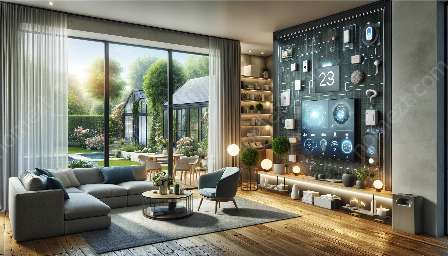Modern homeowners are increasingly seeking ways to integrate sustainability into smart home design. With advancements in technology and the growing emphasis on sustainable practices, the concept of sustainability in smart home design has gained considerable attention. This topic cluster aims to explore the key aspects of sustainability in smart home design, its compatibility with smart home trends, and its alignment with intelligent home design principles.
Understanding Sustainability in Smart Home Design
In the context of smart home design, sustainability encompasses various elements, including energy efficiency, resource conservation, and environmental impact reduction. Sustainable smart homes are built with a focus on minimizing energy consumption, utilizing eco-friendly materials, and incorporating renewable energy sources.
Energy Efficiency: Smart home technologies play a pivotal role in enhancing energy efficiency. Automated systems for lighting, heating, and cooling enable precise control over energy usage, reducing waste and promoting sustainability.
Resource Conservation: Sustainable smart home design emphasizes the efficient use of resources such as water and materials. Incorporating smart appliances and fixtures that minimize water consumption contributes to conservation efforts.
Environmental Impact Reduction: Smart home systems can be integrated with environmental monitoring and control mechanisms to minimize carbon emissions and waste generation. This proactive approach aligns with the goal of reducing the environmental impact of modern homes.
Compatibility with Smart Home Trends
Sustainability in smart home design aligns with current trends in the smart home industry. The integration of sustainable practices into smart homes reflects the evolving preferences of homeowners who prioritize environmental responsibility and energy consciousness. The following are key areas where sustainability intersects with smart home trends:
- Enhanced Energy Management: Smart home solutions are evolving to offer advanced energy management capabilities, allowing homeowners to monitor and optimize energy usage in real time. This aligns with the sustainability aspect of reducing energy consumption and promoting eco-friendly practices.
- Integration of Renewable Energy Sources: Smart home technologies are increasingly incorporating solar panels, wind turbines, and other renewable energy systems to harness clean and sustainable power. This trend resonates with the sustainability principle of reducing reliance on non-renewable energy sources.
- Incorporation of Eco-Friendly Materials: The use of eco-friendly construction materials and interior elements is becoming more prevalent in smart home design. This trend reflects the growing demand for sustainable and non-toxic building materials that contribute to healthier indoor environments.
Intelligent Home Design and Sustainability
The concept of intelligent home design encompasses the seamless integration of technology, functionality, and aesthetics. Sustainable smart homes exemplify intelligent design by harmonizing eco-friendly features with state-of-the-art innovations. The following aspects highlight the synergy between intelligent home design and sustainability:
- Enhanced Comfort and Efficiency: Sustainable smart home solutions are designed to optimize comfort and convenience while minimizing environmental impact. From automated climate control to energy-efficient lighting, these features underscore the marriage of intelligent design and sustainability.
- Adaptability and Future-Proofing: Intelligent home design principles emphasize adaptability and scalability. Sustainable smart homes are designed to accommodate future technological advancements and evolving environmental standards, ensuring longevity and relevance in an ever-changing landscape.
- User-Centric Approach: Intelligent home design prioritizes the needs and preferences of homeowners. Sustainable smart home features are tailored to enhance the overall living experience while promoting eco-conscious habits and resource-efficient practices.
Conclusion
Sustainability in smart home design reflects a forward-thinking approach that integrates environmental responsibility with technological innovation. By embracing sustainable practices, smart homes can become eco-friendly, energy-efficient, and aesthetically appealing living spaces. The alignment of sustainability with smart home trends and intelligent home design principles paves the way for the widespread adoption of sustainable smart homes, creating a positive impact on both individuals and the environment.


